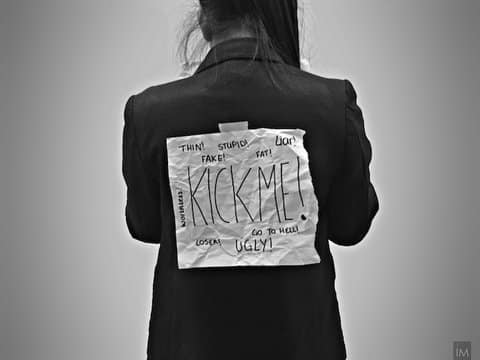
16 Feb ‘You Don’t Look Chinese’ – How Bullying Shaped One Student’s Identity

(Image via Canva / Ethnic Media Services)
Commentary, Jeannine Chiang for Ethnic Media Services
“You’re Korean, right? I mean, you don’t look very Chinese. It’s a compliment by the way,” my classmate said with a stifled laugh, nudging her friend. I’d recently transferred into a new, mostly white middle school.
This wasn’t going to be an easy transition, I soon realized.
I remember the intense side-eyes as kids around me turned their heads, dropping their gaze to the jade pendant my grandma gifted me for good luck.
This was soon after schools reopened following the pandemic closures, and terms like “kung flu” were still flying around school hallways. It felt to me like even here in the Bay Area, where Asians are a large percentage of the population, being Chinese, or even just looking Chinese, was like having a target on your back.
>>>Q&A: Nonprofit Gives Mental Health Support to Bay Area Chinese Community
Growing up in Millbrae, a small, majority-Asian suburb just south of San Francisco, I never felt out of place. There were a few occasions when a classmate would insist that “this is America” and that I should speak English, but those experiences were few and far between.
It was when my family moved south and I enrolled in a new, majority-white middle school that I began to understand for the first time that to fit in among my new peers, I would have to “Americanize” my identity.
The challenges began in the cafeteria. I would hear classmates commenting on my lunchbox, which often contained homemade dumplings and stir-fried noodles. Every day’s lunch ritual was a reminder that I was different, like an outsider wearing a distinctive cultural badge.
I grew self-conscious and eventually asked my mom to prepare peanut butter and jelly sandwiches instead. The fruity, sugary snack eventually became my new normal.
Constantly negotiating my identity was a manifestation of my struggle to fit in and be accepted. I realized that I was trying to cover over the parts of my culture that might appear “too different.” My native tongue turned into a clandestine code that I whispered in low voices to prevent further alienation.
>>>Read: Racism and Violence Against AAPI People ‘Is Nothing New’
I concealed my ancestry out of concern that its vivid hues would contrast with the subdued tone of my environment. And I wasn’t the only one. One study last year found that 1 in 5 Asians try to hide parts of their identity to fit in.
For me, that struggle turned into a mental war that I waged in silence, grappling – like most teenagers – with the desire to fit in while also trying to hold on to my cultural roots.
My mother was born in Hangzhou, China, and immigrated to California to attend college. And while my brother and I were born in San Francisco, growing up we spoke mostly Mandarin at home. As I got older, I began to understand what my mom gave up coming to the U.S.: her friends, her family, her culture. And now, here I was, trying to hide that culture from the other students around me at school.
I felt ashamed. But I still tried to fit in. I had the impression that I was a chameleon, always changing to fit the expectations of everyone around me, either at home or at school.
I’m in high school now, and when I talk to my international friends from China here, they share similar stories, about how they’re targeted by other students because of their backgrounds, or because of their accents, something they can’t just hide away in a lunchbox. Rather than celebrating the richness of culture and experience they bring to the student body, they’re targeted for those very same traits.
School bullying is on the rise in the U.S., with 20% of K-12 students saying they’ve been bullied at least once. Identity is often a contributing factor, with students singled out because of their nationality, ethnicity, or gender.
>>>Read: ‘Prepare Ourselves, and Protect Yourself’: Students Open Up About Bullying
In a diverse community like the Bay Area, it is crucial that schools promote understanding and appreciation of different cultures, fostering an environment where everyone feels accepted and valued regardless of their accent or cultural background.
My experience reminds me that there is still work to be done in the fight against racism. It necessitates a group effort to eliminate prejudices, confront preconceptions, and create an atmosphere where each person may flourish in their true self.
>>>Read: See Race Relations Through the Eyes of Young People Coming of Age
But it also taught me to see my differences as a unique strength rather than a weakness. By questioning the dominant narratives, I found allies who stood with me, bringing an end to the taboo that surrounds the experiences of people who feel excluded.
By working together, we’ve created a school community that embraces diversity and promotes an atmosphere that is more welcoming to all. Instead of being a victim of prejudice, I stand as an example of the strength that comes from embracing one’s individuality.
Jeannine Chiang is a high school junior. She wrote this story for a special series looking at the intersection of bullying and race in California led by EMS in partnership with California ethnic media, part of EMS’s Stop the Hate initiative, made possible with funding from the California State Library in partnership with the California Commission on Asian and Pacific Islander American Affairs. The views expressed on this website and other materials produced by EMS do not necessarily reflect the official policies of the CSL, CAPIAA or the California government.






No Comments